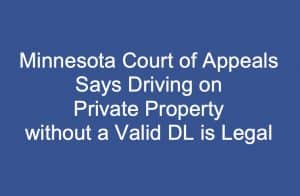Driving Without a Valid License on Private Property is Permissible
Recently, the Minnesota Court of Appeals overturned a driving with a cancelled driver’s license and DWI because the driver was driving on his driveway when the officer arrested him. In State v. Velisek, the court reversed Velisek’s convictions because the statute prohibiting a person with a cancelled license from operating a motor vehicle anywhere in the state that requires a driver’s license. The court then turned to the statute regarding the license requirements, which states that “a person shall not drive a motor vehicle upon a street or highway in this state unless the person has a valid license.” Since the language of the statutes were unambiguous, and Velisek was not on a street or highway, the court found that he did not violate the law by driving with a cancelled license.
When the officer made the arrest, he noticed that Valisek was slurring his words, and obtained a warrant for a blood or urine sample, which tested positive for methamphetamine. However, since the arrest violated Velisek’s Fourth Amendment rights, any evidence obtained from the unlawful arrest is inadmissible. The Fourth Amendment protects people from unlawful searches and seizures by the government. A police officer must have probable cause to make an arrest, or lawfully seize an individual, and all evidence obtained from the unlawful search or seizure is typically inadmissible in court.
Generally, Minnesota’s driver license laws only prohibit people from driving without a license on streets and highways. The court did mention that this includes parking lots, and other public areas that the danger to other people becomes present when someone is driving without a valid license. The Minnesota Court of Appeals stressed that there is more protection for people on their own private property compared to public property. The court cited expectation of privacy in items placed outside the curtilage of a private residence, such as garbage has fewer constitutional protections than within a home or its curtilage.
Minnesota’s driving without a valid license statutes (driving after cancellation, driving after revocation, driving after suspension, etc.) use similar language compared to Minnesota’s DWI statutes. The DWI statute prohibits driving while impaired within this state or any boundary water of this state, which is like the actual driving after cancellation, revocation, and suspension statutes. The Minnesota Court of Appeals distinguished this case by using Minnesota Statutes Section 171.02, Subdivision 1 that states a person shall not drive a motor vehicle upon a street or highway in this state unless the person has a valid license. It will be interesting to see if the Minnesota Supreme Court decides to hear this case; and, if so, how they will decide the issue.
Robert H. Ambrose is a criminal defense attorney and DUI lawyer in the Twin Cities. Minnesota. Super Lawyers named him a Rising Star for the past six years; and the National Trial Lawyer’s Organization named him a Top 40 Under 40 Trial Lawyer the past seven years. He is an adjunct professor at the University of Minnesota Law School. DWI Lawyer Washington County MN; Criminal Defense Lawyer St. Paul MN; and Criminal Appeals Attorney Minnesota.

